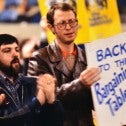1983 – 1992
The pundits predicted the decade would see the decline and fall of public sector unions.
CUPE proved them wrong.
The 80s were a time of excess and extremes. The cold war arms race escalated- then ended. Computers began to make the world faster – and the Internet made it smaller.
President Jeff Rose knew that many of a union’s biggest battles were fought in the political arena. Working with Rose as secretary-treasurer was Jean Claude Laniel.
CUPE switched into full campaign mode with the “Ways of Winning” conference in 1987. In city after city, CUPE locals convinced municipal councils not to contract services out, and to start contracting work back in.
Record-breaking demonstrations swept the country. CUPE pushed on all fronts, joining a national campaign for quality non-profit child care and launching the Air Fair campaign, fighting deregulation.
B.C.’s anti-union legislation sparked a walkout by a quarter of a million workers in 1987.
The New Brunswick government tried to break signed contracts in 1992. An eight-day illegal strike by CUPE forced them to back down.
In 1984, “Defending CUPE” began training members in grassroots activism. Within five years, there were more than 3,000 graduates – more than half of them women.
70,000 Ontario hospital workers winning a jointly trusted pension plan.
We launched the Airline Division in 1984 after the when 7,000 members of the Canadian Airline Flight Attendants Association voted to merge with CUPE.
CUPE created a remembrance day for workers killed or injured on the job in 1984. Today, the national day of mourning for workers killed or hurt on the job is commemorated around the world on April 28.
The union’s first pay equity conference in 1986 made that issue part of CUPE’s core bargaining approach.
CUPE began a campaign of anti-discrimination education immediately, and created the Equal Opportunities Department.
And CUPE pioneered the labour fight for equality for LGBT members. From family recognition to survivor pension benefits, the union fought hard in court and at the bargaining table.



